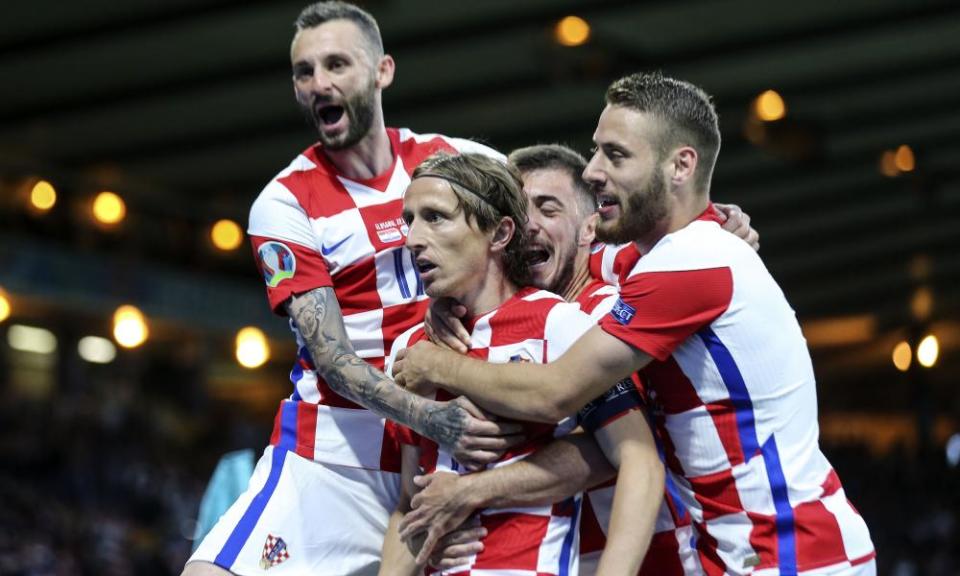Croatia’s brain Luka Modric bewitches and bewilders Scotland to Euros exit

No one will ever know if Billy Gilmour might have made a difference for Scotland but the overwhelming suspicion is that it was always destined to be Luka Modric’s night.
Long before the end, it had become abundantly apparent that a supposedly “past it” Croatia were raging against the dying of their collective light and Modric remains a magnificent, imperiously gifted footballer.
It is said perfection is a flame many touch yet few can hold but on Tuesday night Zlatko Dalic’s captain most definitely belonged to the latter group. The Real Madrid midfielder may be 35 now but he is no has been.
Related: Scotland’s Euro 2020 dreams dashed as Croatia and Modric turn on the style
Not for nothing is Modric dubbed the “brain” of Dalic’s side and when he applied the outside of his right foot to the ball and scored Croatia’s audaciously swerving second goal, no one dared patronise the 2018 World Cup finalists anymore.
At that point Steve Clarke surely knew the game was well and truly up for his spirited yet limited Scotland. When Ivan Perisic subsequently made it 3-1 there can have been no complaints. Defeat and elimination from Euro 2020 undoubtedly hurt but the score was fair on a night when Hampden Park was illuminated by special talents capable of bewitching neutrals and bewildering his players in equal measure.
If Modric was a joy to watch Perisic, Josko Gvardiol and Bruno Petkovic also seemed to belong in a different stratosphere at times.
Gilmour is an extremely promising young Chelsea midfielder and shone in Friday’s 0-0 draw against England at Wembley but it is hard to see how a 20-year-old cruelly confined to his hotel bedroom near Darlington in the wake of a positive Covid test could have second-guessed this lot.
Admittedly Scotland were outmanoeuvred and outnumbered in midfield but their latest failure to reach the knockout stages of a major tournament was arguably rooted in an alarming goal drought that dictated they kicked off as the only country without a goal at Euro 2020.
Che Adams was widely regarded as offering their best hope of breaking this scoring impasse but when, very early on, John McGinn crossed invitingly, the stretching Southampton striker could not quite connect with the ball and the moment was gone. It was strangely emblematic of his adopted country’s tournament.
Granted it was not too long before Andy Robertson’s cross reached Callum McGregor’s feet at the edge of the 18-yard box and a stellar steadying touch later Scotland’s first tournament goal for 23 years nestled in the back of the net.

Unfortunately for Clarke, by then Nikola Vlasic had already opened the scoring for Croatia and his players were chasing the game. Dalic’s side had failed to beat Scotland in five previous attempts, yet the ease with which Modric drifted between his familiar station in front of the defence and an attacking midfield role indicated imminent change.
Initially Clarke’s team had endeavoured to harry and hassle Croatia off the ball as they attempted to create a high tempo but their opponents were not prepared to be bullied into submission, let alone forced into unnecessary errors.
Instead they moved the ball with a fluency and dexterity that served as a riposte to critics who had been so quick to write them off. Where Scotland tended to snatch at the ball and hurtle into challenges, Modric and company remained poise personified as they zipped low passes around the pitch.
It was an exercise in more than merely using their quick feet and often even faster brains to create a series of geometric passing patterns. There was a sense that, sooner or later, all this accomplished exploration of the angles would detect pockets of penalty area space unanticipated by Clarke’s central defensive trio.
Sure enough, when the increasingly menacing Perisic met a deep cross and out-leapt all-comers, no marker could get sufficiently close to prevent Vlasic controlling the dropping ball and lashing it beyond David Marshall.
When a knee injury ended Grant Hanley’s night and his defensive replacement, Scott McKenna, collected a booking for charging into Petkovic before he had even touched the ball, the game seemed all but up for Scotland.
True, there was that glorious equalising interlude – a real moment in the sun – when McGregor did a passable Ally McCoist impression and Hampden echoed to an approving, ecstatic, chorus of: “No Scotland, no party.” However, Gvardiol was proving a key catalyst as Croatia regained their earlier slick passing momentum and although McGinn came inches away from a goal, no one can have been entirely surprised when, courtesy of Petkovic’s sublime taming touch, Modric produced his pièce de résistance.
As the Croatia captain’s corner prefaced Perisic dodging Kieran Tierney and heading Croatia’s third, Gilmour’s hotel room must have felt like a prison cell.

 Yahoo Sport
Yahoo Sport 





































